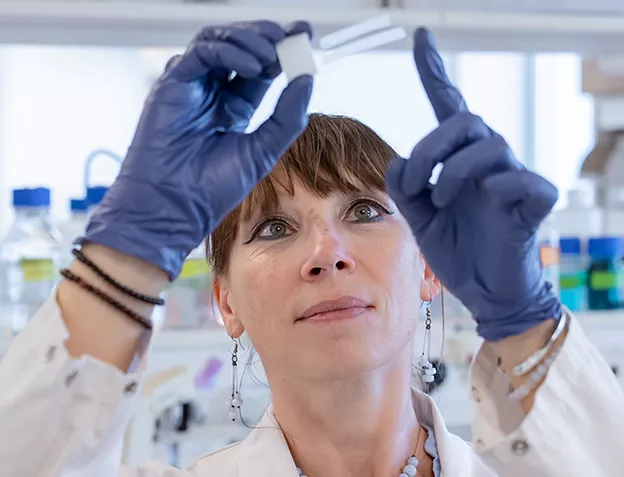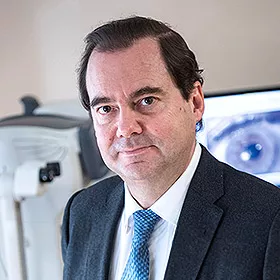IHU FOReSIGHT
The University Hospital Institutes (IHU) were created in 2011 by the French government to invent the medicine of tomorrow, future treatments and new practices to improve patient care. They are places of scientific and medical excellence, built on a single site integrated around a central theme.
What is an IHU?
Their four fundamental pillars:
One or more recognised health care services.
World-class research teams.
Internationally attractive university education.
Exploitation of discoveries through efficient partnership and translational research.
The main missions of an IHU are to develop diagnostic tools and innovative therapies by bringing basic research closer to clinical concerns, to strengthen knowledge transfer through an integrated training pathway, to accelerate the transition between research and therapeutic applications and to enhance the economic value of scientific discovery and innovation.

The 19 IHUs
| IHU | City | Service |
|---|---|---|
ICM | Paris | Neurology |
ICAN | Paris | Cardiology/Cardiometabolism and Nutrition |
Imagine | Paris | Genetics |
Lyric | Pessac | Cardiology |
IHU of Strasbourg | Strasbourg | Gastroenterology |
IHU Mediterranean Infection | Marseille | Infectiology |
| IHU | City | Service |
|---|---|---|
FOReSIGHT | Paris | Ophthalmology |
| IHU | City | Service |
|---|---|---|
THEMA 2 | Paris | Oncology/Leukemia |
Re-Connect | Paris | Neurology/Hearing Disorder |
Women's Cancer | Paris | Gynecologic Oncology |
InovAnd | Paris | Pediatric Neurology/Neurodevelopment |
Prometheus | Garches | Infectiology/Sepsis |
PRISM | Villejuif | Oncology |
VBHI | Bordeaux | Neurology/Cerebrovascular Disease |
HealthAge | Toulouse | Gérontology |
Infiny | Nancy | Gastroenterology/Inflammatory Bowel Disease |
Everest | Lyon | Hepatology |
RespiERA | Nice | Pneumology |
Immun4cure | Montpellier | Infectiology/ Systemic Autoimmune Diseases |
IHU FOReSIGHT
Since 2019, the IHU FOReSIHGHT for Vision has brought together the main players in research and care dedicated to vision diseases.
The IHU FOReSIGHT, created by its 3 founding members (Sorbonne University, Inserm and the hôpital National des 15-20), is focused on the Institut de la Vision and the hôpital National des 15-20).
It also integrates, as non-founding partners, the ophthalmology departments of the APHP, the Adolphe de Rothschild Foundation Hospital and the Neurospin laboratory (CEA).
It is supported and coordinated by the Fondation Voir et Entendre.
This ecosystem is united around a common objective: to bring out the care of tomorrow in ophthalmology, by accelerating research and access to therapeutic innovations from the Institut de la Vision and its partners.
Faced with an ageing population and the impact of our lifestyles on our vision, there are many public health challenges to be addressed. Epidemiological studies indicate a doubling of visual impairments leading to blindness in the next 30 years and a tripling of the number of visually impaired people, reaching 600 million people affected by visual impairment worldwide by 2050.
The objectives of the IHU are to:
To accelerate research, to understand our vision and its pathologies, as well as the development of the visual system, to develop therapeutic and diagnostic innovation in ophthalmology and to accelerate the transfer of these innovations to the clinical field.
Facilitate the patient's care pathway by assessing the relevance of therapeutic innovations for the patient and for society, improving patient care whatever the stage of the disease and wherever the patient lives, and by using artificial intelligence for diagnosis and assistance in therapeutic choice.
To promote education, to train expert patients, caregivers and professionals in the sector in therapeutic innovations and new patient care and to build education for all in ophthalmology.
To support the visually impaired by helping them to meet the challenges of everyday life and by restoring their quality of life and autonomy.
The major challenges faced by IHU FOReSIGHT to achieve its objectives
The major challenges are to identify and support research projects with an application that is quickly transferable to patients.
In order to accelerate the transfer, IHU FOReSIGHT promotes the synergy of knowledge in both directions : from research to application to the patient, but also from clinical observations made on the patient to research.
It brings together a world-class scientific and clinical community, particularly around major public health issues: the aging of our populations and the study of its specific impact on the eye and vision, personalized and precision medicine (through imaging, the study of biomarkers and disease modeling, etc.). to support the evolution of medical models) and epidemiology (through the study of the influence of the environment on ocular pathologies and vigilance, material and pharmacovigilance, in particular the side effects of new therapies... to measure the impact of and on our societies.
It contributes to the financing of the selected projects.
Today, restoring sight to patients who have lost it is no longer a pipe dream. Gene and cell therapy, optogenetics or sonogenetics, retinal implants... These are all innovations that we need to help accelerate knowledge and transfer to patient.
Governance
The IHU was created and directed by Prof. José-Alain Sahel until 2023. Today, it is directed by Prof . Christophe BAUDOUIN.

Prof.
Christophe Baudouin,
director of the Institut Hospitalo-Universitaire FOReSIGHT
